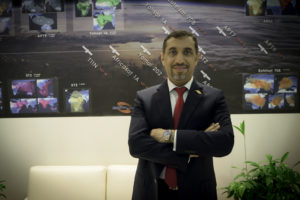 In the latest SpaceWatch Middle East interview, Torsten Kriening talks to Hadi Nazari, Group CEO of NorthTelecom, about their recent acquisition and future market trends at CabSat 2017.
In the latest SpaceWatch Middle East interview, Torsten Kriening talks to Hadi Nazari, Group CEO of NorthTelecom, about their recent acquisition and future market trends at CabSat 2017.
Hadi, thanks for your time today. Can you tell us about your general assessment of the satellite communications market today?
We see threats and opportunities. The first threat is demand and excess capacity. On the one hand, we are witnessing excess capacity in terms of new technologies in HTS, for example such as EPIC or the new constellations in LEO. It’s not just in terms of space segment, but it is in terms of ground equipment too. On the other hand, not enough attention has been paid in terms of vertical markets such as the oil and gas market. More attention needs to be paid to the other verticals such as disaster recovery and education and this is something that NorthTelecom is currently focusing on.

I would like to call on all in the supply chain to work hand-in-hand and to collaborate more. Satellite operators need to work with services providers, service providers need to work with system integrators and with resellers. For NorthTelecom, in addition to the organic growth that we have experienced in the past 7 years, we have decided to form partnerships all across the globe. We have started with our acquisition of ScopeTel in Malaysia. ScopeTel brings a lot of value to the NorthTelecom Group. The acquisition further strengthens NorthTelecom’s position in the APAC market. ScopeTel is a system integrator and it can basically bring in different value for vertical markets such as oil and gas where NorthTelecom didn’t previously have as much strength. The combination of ScopeTel’s many years of experience in the oil and gas and maritime telecommunication sectors combined with NorthTelecom’s World Class Satellite services and solutions means we can provide a first-class service to our customers.
Since NorthTelecom is also very strong with other verticals, and has other expertise, we have decided to use this to expand our global reach and we are also set to complete another two acquisitions in 2017. This is our present corporate strategy – to strengthen our offering through meaningful partnerships.
Will the new acquisitions operate under NorthTelecom’s name or will they retain their own identity?
That’s a good question. We are not merging, but acquiring new companies so we will not be changing any company names to help them to remain independent in the market. We want to bring to them NorthTelecom’s experience and support and we will utilise their strengths to enhance our offering.

You talked about an excess of capacity. You operate in a market where we have a situation of overcapacity. How do you deal with it? How do you see the future with all the new constellations in the pipeline and the fact that anyone can be a satellite operator?
This is also a great question. I think that we need media like you to raise this question. We need to be realistic and not over optimistic with the impending situation. Over the past two years I have repeatedly said that the market is suffering from a lack of investment. If you are very limited to a niche vertical such as oil and gas, you cannot utilise much more capacity. You can see what happened with oil and gas. Instead of having more demand you see shrinking demand in the market.
My idea would be to urge the players in this market to work hand-in-hand with the service providers and the system integrators to promote their idle capacity for niche verticals or for verticals where there is an opportunity but there was no investment or introduction of satellite use. Still, 62% of the population around the world still has no connectivity so, do you want to tell me that someone will go and build a cellular infrastructure? Installing a cellular infrastructure in central Africa would be a nightmare. And then you have a company like Facebook who want to put a balloon up to create connectivity. For me, there is no point in re-inventing the wheel. There is a lot of satellite capacity and we can use this satellite capacity now. But we also have to ask ourselves, do we have the right ecosystem? We need system integrators and service providers who have a comprehensive knowledge on the ground. Everyone needs to work together to put this ecosystem in place. This in turn would produce new verticals that will generate more demand.
Are you not doing the satellite operator’s job in terms of demand creation?
The satellite operator has the capacity, but the capacity is not enough to succeed in this demand situation. Service providers and system integrators need raw materials. So the question would be who is going to pay? I don’t think that Africans would be able to pay. So, instead of keeping that capacity idle, the satellite operators would partner with the system integrators and service providers to utilise this capacity at prices similar to other verticals – in some kind of a strategic partnership. Due to the fact that this is a very niche market, I don’t think we are very attractive to private equity companies and banks. They are investing with satellite operators, but not with the smaller guys. We need more interest for the private equity and venture capitalists
Interesting that you mention that the financial market. Space is now a target for investors but its more in terms of access to space and NewSpace. This has nothing to do with our satcom market. This market has been quite static over recent years. Where is the disruption in the satcoms market?
It is a matter of time. We need to wait to see how many years it will take to see these new constellations in action or whether they will even get to that point. This technology is something disruptive. There are 6 billion that have never been connected, never used a smartphone etc, so the important question to ask is who will support them? Does the satellite operator have the ability to support them? My answer is no. At NorthTelecom, we have a customer support mentality and we know the customer on the ground, as the system integrators do. Even in the current market, something is missing in our industry and that is collaboration. Collaboration does not mean Merger and Acquisition. Industry players are too focused on keeping themselves safe and they are not concerned as to whether that is hurting others in the industry. I believe that we need to put a culture in place for the collaboration and somehow the protection of the industry. Otherwise we will end up killing each other off through a price war – and I don’t think there would be a winner.
SpaceWatch Middle East thanks Hadi Nazari, Group Chief Executive Officer of North Telecom, for the interview.
Original published at: https://spacewatch.global/2017/04/spacewatchme-interviews-hadi-nazari-northtelecom/

 SpaceWatch.Global An independent perspective on space
SpaceWatch.Global An independent perspective on space

